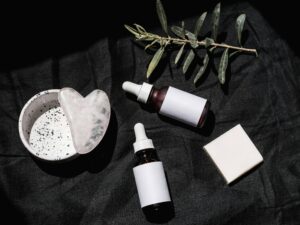

Acne-prone skin


For those of us blessed with oily skin, the struggle is real. While it boasts a youthful resilience, the constant battle against shine can leave us feeling frustrated. But fear not, fellow skincare enthusiasts! The world of plant-based skincare offers a treasure trove of solutions waiting to bring balance and a healthy, matte glow back to your complexion.
Conventional skincare often relies on harsh chemicals that strip the skin of its natural oils. This disrupts the skin’s delicate ecosystem, triggering a rebound effect – even more oil production! This frustrating cycle leaves you feeling defeated and your skin worse off. Plant-based ingredients, on the other hand, take a gentler approach. They work in harmony with your skin’s natural chemistry, regulating oil production and leaving it balanced and healthy.
Think of these botanical heroes as gentle warriors, working alongside your skin to achieve optimal balance. They’re packed with natural vitamins, minerals, and antioxidants that nourish and soothe, promoting a radiant and healthy complexion.
Now, let’s delve into the world of superstar botanical ingredients that can transform your oily skin routine:
Witch Hazel: This astringent wonder is a natural pore minimizer. It helps tighten pores, reduce excess oil, and fight inflammation, all without the drying side effects of alcohol. Witch hazel is a gentle yet effective way to keep your skin looking refreshed and shine-free.
Green Tea: Don’t just sip it, reap the benefits of green tea on your skin too! Packed with antioxidants, green tea soothes and calms the skin while regulating oil production. Its anti-inflammatory properties also help combat pesky breakouts, making it a multi-tasking marvel for oily and acne-prone skin.
Kaolin Clay: This gentle clay is a champion at absorbing excess oil and impurities without stripping the skin. Unlike harsh chemical exfoliants, kaolin clay works gently to remove dead skin cells and unclog pores, leaving you feeling refreshed, mattified, and oh-so-smooth.
Aloe Vera: This cooling hero is a godsend for oily skin. It hydrates without clogging pores, soothes irritation, and promotes healthy cell turnover for a radiant complexion. Unlike heavy creams that can leave oily skin feeling greasy, aloe vera provides lightweight hydration, keeping your skin balanced and healthy.
These are just a few examples of the many plant-based ingredients that can benefit oily skin. With a little research, you can discover a whole world of botanical wonders waiting to transform your skincare routine.
Ready to translate this plant power into an action plan? Here’s your personalized plant-powered skincare routine:
Cleanse: Morning and night, use a gentle, plant-based cleanser to remove excess oil, dirt, and makeup. Think coconut milk or green tea for a refreshing cleanse. Look for cleansers that are formulated for oily skin and avoid harsh sulfates that can strip your skin’s natural oils.
Tone: Witch hazel makes a fantastic alcohol-free toner to minimize pores and balance oil production. Apply a toner with a cotton pad after cleansing, focusing on areas prone to shine.
Moisturize: Oily skin still needs hydration – surprise! Opt for a lightweight, oil-free moisturizer with hyaluronic acid or aloe vera to keep your skin plump and balanced. Hyaluronic acid attracts and retains moisture, leaving your skin hydrated without feeling greasy.
Treat: Treat yourself to a weekly clay mask with kaolin clay to deeply cleanse and absorb excess oil. Apply the mask to clean, dry skin and leave it on for 10-15 minutes before rinsing thoroughly.
Protect: Don’t forget sunscreen! Choose a non-comedogenic sunscreen that won’t clog your pores. Look for mineral sunscreens with zinc oxide or titanium dioxide for broad-spectrum protection.
Bonus Tip: Blotting papers are your new best friends! These handy tools help mattify your skin throughout the day without messing up your makeup. Simply blot away excess oil throughout the day for a shine-free finish.
Remember, consistency is key! By incorporating these plant-based heroes into your routine, you’ll be well on your way to achieving a naturally matte, healthy-looking complexion. So ditch the harsh chemicals, embrace the power of plants, and let your skin shine (with a healthy, controlled glow, of course)!
The best plant-based routine for you depends on your unique skin’s needs! Here are some things to consider:
Breakout Prone: If you struggle with acne breakouts, witch hazel and tea tree oil can be powerful allies. Witch hazel, with its astringent properties, helps minimize pores and control excess oil, while tea tree oil’s antibacterial properties combat acne-causing bacteria. However, be mindful – tea tree oil can be drying, so spot treatment is recommended for breakouts rather than full-face application.
Climate: Consider your environment when choosing your plant-based heroes. If you live in a humid climate, lightweight, oil-free formulations are ideal. Hyaluronic acid and aloe vera are fantastic choices for their hydrating properties without leaving a greasy residue. Conversely, if you live in a dry climate, you might benefit from a slightly richer moisturizer with plant-based oils like jojoba or rosehip oil, which mimic your skin’s natural oils and prevent moisture loss.
As you explore the world of plant-based skincare, you’ll encounter various botanical terms. Here’s a quick glossary to help you decipher their benefits:
By understanding these terms and their corresponding benefits, you can make informed choices about the plant-based ingredients that best suit your specific skin needs.
There are some common misconceptions about plant-based skincare. Let’s address a few of them:
Fact: While some plant-based ingredients might take slightly longer to show visible results compared to their synthetic counterparts, they can be incredibly effective in the long run. They work with your skin’s natural processes, promoting long-term health and balance.
Fact: Even natural ingredients can cause sensitivities in some individuals. Patch testing is crucial before incorporating any new product into your routine, plant-based or otherwise.
Fact: While some high-end, luxury plant-based brands can be pricey, there are many affordable options available. Do your research and explore drugstore brands or independent beauty companies that offer effective plant-based products at reasonable prices.
Here are some frequently asked questions about plant-based skincare for oily skin:
A: Essential oils can be very potent and may irritate sensitive skin. It’s best to use them diluted in a carrier oil and avoid direct application. Consult a dermatologist before using essential oils on your face.
A: Everyone’s skin is different, but generally, it can take 4-6 weeks to see noticeable results. Be patient and consistent with your routine for optimal results.
A: Plant-based skincare products are becoming increasingly popular. You can find them at drugstores, beauty stores, online retailers, and even some farmers’ markets. Look for brands that are cruelty-free and use ethically sourced ingredients.
By understanding the power of botanical ingredients and building a personalized plant-powered routine, you can achieve a healthy, balanced, and naturally radiant complexion. Embrace the journey of exploring the world of plant-based skincare and discover the botanical heroes that will transform your oily skin!
Sustainable Shades For many DIY enthusiasts and design aficionados, a fresh coat of paint is…
Cruelty-Free Solutions for a Healthier You Chronic inflammation can be a relentless foe, disrupting our…
Unleashing Your Brain's Potential In today's fast-paced world, maintaining sharp mental focus and cognitive agility…
Exploring DIY Organic Makeup Fixers For the eco-conscious beauty enthusiast, the quest for flawless makeup…
A Sensitive Exploration The clean beauty movement has taken the beauty world by storm. Consumers…
Taming the Mane Frizz – the bane of smooth hair dreams. It can transform a…
This website uses cookies.